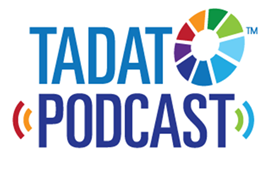Posted by Thibault Vermeulen, Chrys-Michel Esseau, and Deise Miller Silva[1]
The TADAT (Tax Administration Diagnostic Assessment Tool) Unit of the IMF’s Fiscal Affairs Department (FAD) is pleased to announce the launch of its new TADAT Podcast!
The podcast was created in response to comments from a recent TADAT survey, which reflected the need for more regular feedback to the TADAT community from the TADAT Secretariat. The podcast takes the form of interviews with FAD staff as well as experts on tax administration from around the world. Its main goal is to establish a real-time knowledge exchange platform for tax administration officials and capacity development partners to explore their experiences with improving tax administration in line with international good practices. The podcast will be available in English, French, Spanish and Portuguese.
In the first episode of the Podcast, titled “The Global Nature of TADAT”, our guests, Michael Keen, Deputy Director in the IMF’s Fiscal Affairs Department, and Doris Akol, Commissioner General of the Uganda Revenue Authority, discuss the following questions: Are the tax administration principles measured through TADAT “Western”? And given the varying levels of development and the variety of internal processes and procedures of tax administrations around the world, can we expect TADAT to be universally applicable? Episode 1 addresses these questions by exploring the origins of TADAT and the Uganda Revenue Authority’s experience with their two TADAT assessments and numerous training events. Our guests argue that many outcomes of tax administration are universally agreed. TADAT, which focuses on outcomes, can therefore be applied to any country, regardless of region or income level.
The TADAT initiative is part of a wider international agenda to help countries strengthen their tax systems. Improved domestic revenue mobilization means that countries can provide essential goods and services to their citizens in an economically sound and sustainable way. TADAT aims to provide an objective and standardized assessment of the relative strengths and weaknesses of the key components of a country’s tax administration system.
TADAT is modelled on the performance measurement framework developed under the Public Expenditure and Financial Accountability Program (PEFA), thus representing the revenue counterpart to the PEFA performance assessments.
TADAT assessments are particularly helpful in:
- Identifying the relative strengths and weaknesses in tax administration systems, processes, and institutions.
- Facilitating a shared view of the condition of the system of tax administration among all stakeholders (e.g., country authorities, international organizations, and technical assistance providers).
- Setting reform objectives, priorities, initiatives, and the sequencing of implementation.
- Facilitating management and coordination of external support for reforms and achieving faster and more efficient implementation.
- Monitoring and evaluating reform progress by way of subsequent repeat assessments.
TADAT is a collaborative effort of the following partners: the European Union, Germany, the International Monetary Fund, Japan, the Netherlands, Norway, Switzerland, the United Kingdom, and the World Bank.
[1] Thibault Vermeulen, Chrys-Michel Esseau, and Deise Miller Silva are Division Coordinators in the IMF’s Fiscal Affairs Department and editors of the TADAT podcast.
Note: The posts on the IMF PFM Blog should not be reported as representing the views of the IMF. The views expressed are those of the authors and do not necessarily represent those of the IMF or IMF policy.






